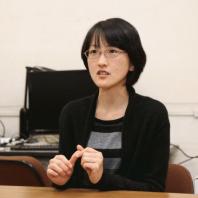![]()
![]()
Research Support Office Research Advancement Division. Tokyo University of Agriculture and Technology
| TEL | +81-42-367-5944 |
|---|---|
| FAX | +81-42-367-5946 |
This program is supported by MEXT’s scientific technology human resource development fee grant, "Program to Disseminate Tenure Tracking System".
Home > Tenured Faculties > Iwai Noriko

Iwai Noriko

| Affiliation | Institute of Agriculture |
|---|---|
| Division | Division of Environment Conservation |
| Research field | Conservation biology, Animal ecology |
| Keyword(S) | Amphibian, aquatic ecosystem, Amami-island |
| Url | https://sites.google.com/site/norikoiwaipage/ |
| Research experience | ・Apr. 2009-Mar. 2010: Post Doctoral Fellow at Forestry and Forest Products Research Institute |
|---|---|
| Educational background | ・2004. B.C. at the University of Tokyo |
| Awards | * The latest information is shown at the member's website. ・2009. Award for the best thesis in the graduate School of Agricultural and Life Sciences, the University of Tokyo |
| Selected papers and publications | * The latest information is shown at the member's website. ・Iwai N (2013) Morphology, function, and evolution of the pseudothumb in the Otton frog. Journal of Zoology 289:127-133. |
High distinct rate of wildlife caused by human impacts on ecosystems is one of the most serious problems on earth. Human impacts cannot be zero, thus we need to balance human impacts and animal conservation in order to achieve sustainable world. Most of the projects on animal conservation so far often insist that human impacts should be totally eliminated to save endangered animals, and not many efforts were made on scientific works to reveal how human impacts can be controlled for animal conservation. My aim here is to give scientific evidences for the way to balance human impacts and animal conservation.
I have been working on frogs in Amami Island, where people have struggles with how to conserve endangered rare species. Because the island is going to be listed as world natural heritage, this theme is exactly in need there. I am trying to build a conservation model to show how much of human impacts (such as forestry or road construction) will lead to a certain degree of decrease in rare species of animals, and show which path way should be considered first.
In order to show what would happen if animals are lost, it is necessary to understand the roles of animals in ecosystems. Because amphibians move between aquatic and terrestrial ecosystems as its nature, they have multiple roles both in aquatic and terrestrial ecosystems as well as being a subsidy to each other. My interests are to know these roles of amphibians with its complex life cycle.
This tenure-track program allows us to spend much time on our own research while obtaining teaching experiences as well. I really appreciate my position with warm encouragements and supports from mentors and professors. Furthermore, some opportunities are provided to know other tenure-track fellows of my age so that we can share information, which will be helpful when planning research life and managing laboratory under this program.